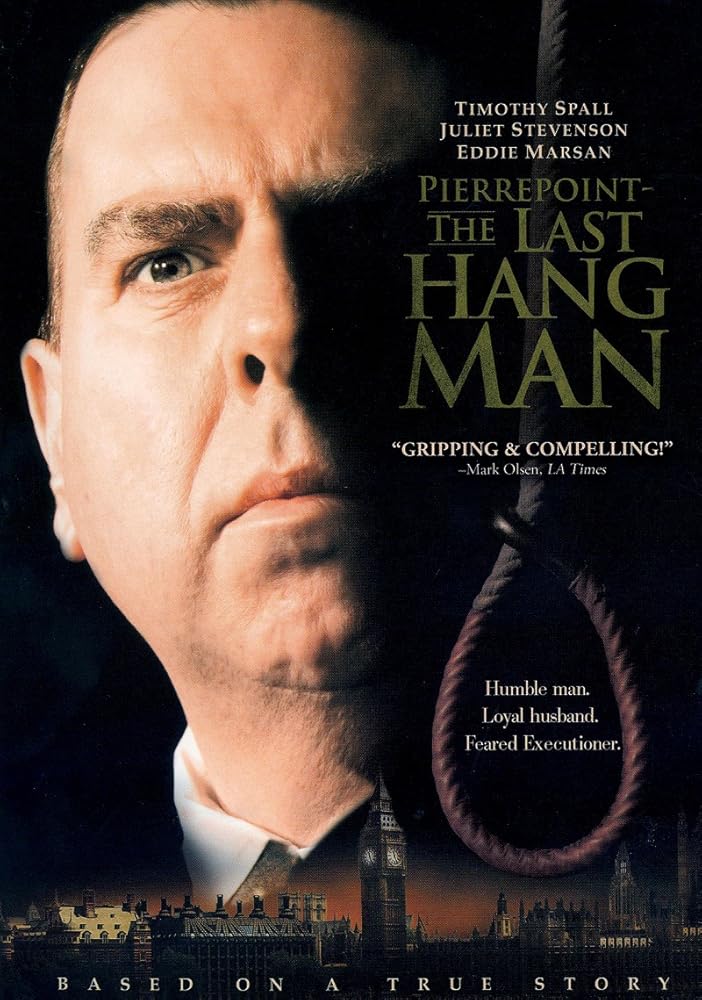
PIERREPOINT (aka: THE LAST HANGMAN)
(director: Adrian Shergold; screenwriters: Jeff Pope/Bob Mills; cinematographer: Danny Cohen; editor: Tania Reddin; music: Martin Phipps; cast: Timothy Spall (Albert Pierrepoint), Juliet Stevenson (Annie Pierrepoint), Cavan Clerkin (George Cooper), Eddie Marsan (Tish), Christopher Fulford (Charlie Sykes), Ian Shaw (Percy), Claire Keelan (Jessie Kelly); Runtime: 90; MPAA Rating: R; producer: Christine Langan; IFC First Take; 2005-UK/USA)
“Plodding biopic.”
Reviewed by Dennis Schwartz
Tries hard to compare even the most humane executions of criminals in Britain with the Nazi gas chambers, believing that legit executions are nothing short of acts of revenge. Though one major difference between the featured Brit hangman and the Nazis, is that he believes once they’re dead they paid their price and should be treated with respect as innocents. There’s no hatred in the hangman for those he executes or does he ascribe to the Nazi plans for extermination.
TV helmer Adrian Shergold makes this a TV driven plodding biopic of Britain’s most famous hangman (though not the last as the alternate title suggests), Albert Pierrepoint (1905-1992), a grocer who moonlights as an executioner. It’s based on a true story but a great chunk of the screenplay by Jeff Pope and Bob Mills is fictitious. Shergold creates an emotionally flat but fine technical and sensitive film, helped in large part by Timothy Spall’s perfectly nuanced performance as the grim hangman perfectionist who between 1934 and 1956 executed some 600 men and women (among them were some wrongly convicted).
Albert Pierrepoint (Timothy Spall) is a reserved, mild-mannered and punctual man who works as a delivery driver in Oldham, in the North of England, where his avaricious wife Annie (Juliet Stevenson) works in the same grocery store. Pierrepoint follows in the footsteps of his father and uncle as hangmen, and soon makes a mark for himself in carrying out the executions with efficiency and speed (his noteworthy accomplishment in the field was that he devised a system of variable lengths of rope, based on a prisoner’s height, weight to ensure that death was swift, painless, and that the head wasn’t removed). Field Marshal Montgomery was so impressed with his ability, that Pierrepoint was called upon to execute over forty Nazi war criminals from the Nuremberg trials. It was Montgomery’s belief that these executions would show to the world that British justice (differing from the Nazis’) was fair but firm. This brought celebrity to Pierrepoint, but eventually a change of heart. Pierrepoint came to oppose capital punishment, but quit his position in 1956 not over a philosophical dispute but one over pay. In the 1970s he returned to the public eye with his book Executioner, a bestseller which spelled-out his new anti-capital punishment beliefs.
Unfortunately Shergold could never quite convincingly execute what makes Pierrepoint a changed man and show how his guilty-conscience eventually got the better of him, as he coyly leaves us thinking of the executioner as a decent man with scruples–which is a sort of revisionist take on the man who went through life sleeping like a baby over his duties until he suddenly had pangs of conscience.
REVIEWED ON 7/16/2009 GRADE: C+